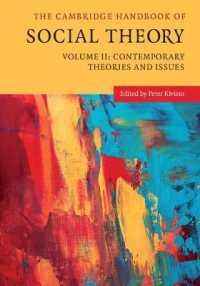- ホーム
- > 洋書
- > 英文書
- > Religion / Ethics
Full Description
In Union Made, Heath W. Carter advances a bold new interpretation of the origins of American Social Christianity. While historians have often attributed the rise of the Social Gospel to middle-class ministers, seminary professors, and social reformers, this book places working people at the very center of the story. The major characters--blacksmiths, glove makers, teamsters, printers, and the like--have been mostly forgotten, but as Carter convincingly argues, their collective contribution to American Social Christianity was no less significant than that of Walter Rauschenbusch or Jane Addams.
Leading readers into the thick of late-19th-century Chicago's tumultuous history, Carter shows that countless working-class believers participated in the heated debates over the implications of Christianity for industrializing society, often with as much fervor as they did in other contests over wages and the length of the workday. Throughout the Gilded Age the city's trade unionists, socialists, and anarchists advanced theological critiques of laissez faire capitalism and protested "scab ministers" who cozied up to the business elite. Their criticisms compounded church leaders' anxieties about losing the poor, such that by the turn-of-the-century many leading Christians were arguing that the only way to salvage hopes of a Christian America was for the churches to soften their position on "the labor question." As denomination after denomination did just that, it became apparent that the Social Gospel was, indeed, ascendant-from below.
Contents
Acknowledgements ; Introduction: The Working-Class Origins of Social Christianity ; Chapter 1 - "Is the Laborer Worthy of his Hire?" The Decline of Democratized Christianity in Antebellum Chicago ; Chapter 2: "Undefiled Christianity" - The Rise of a Working-Class Social Gospel ; Chapter 3: "It Pays To Go to Church" - Ministers, "the Mob," and the Scramble for Working-Class Souls ; Chapter 4: "With the Prophets of Old" - Working People's Challenge to the Gilded Age Church ; Chapter 5: "The Divorce Between Labor and the Church" - Working People Strike Out on Their Own in 1894 Chicago ; Chapter 6: "To Christianize Christianity" - Labor On the Move in Turn-of-the-Century Chicago ; Chapter 7: "Social Christianity Becomes Official" - The Rise of a Middle-Class Social Gospel ; Epilogue: The Fate of American Social Christianity in the Twentieth Century and Beyond ; Notes ; Bibliography ; Index







